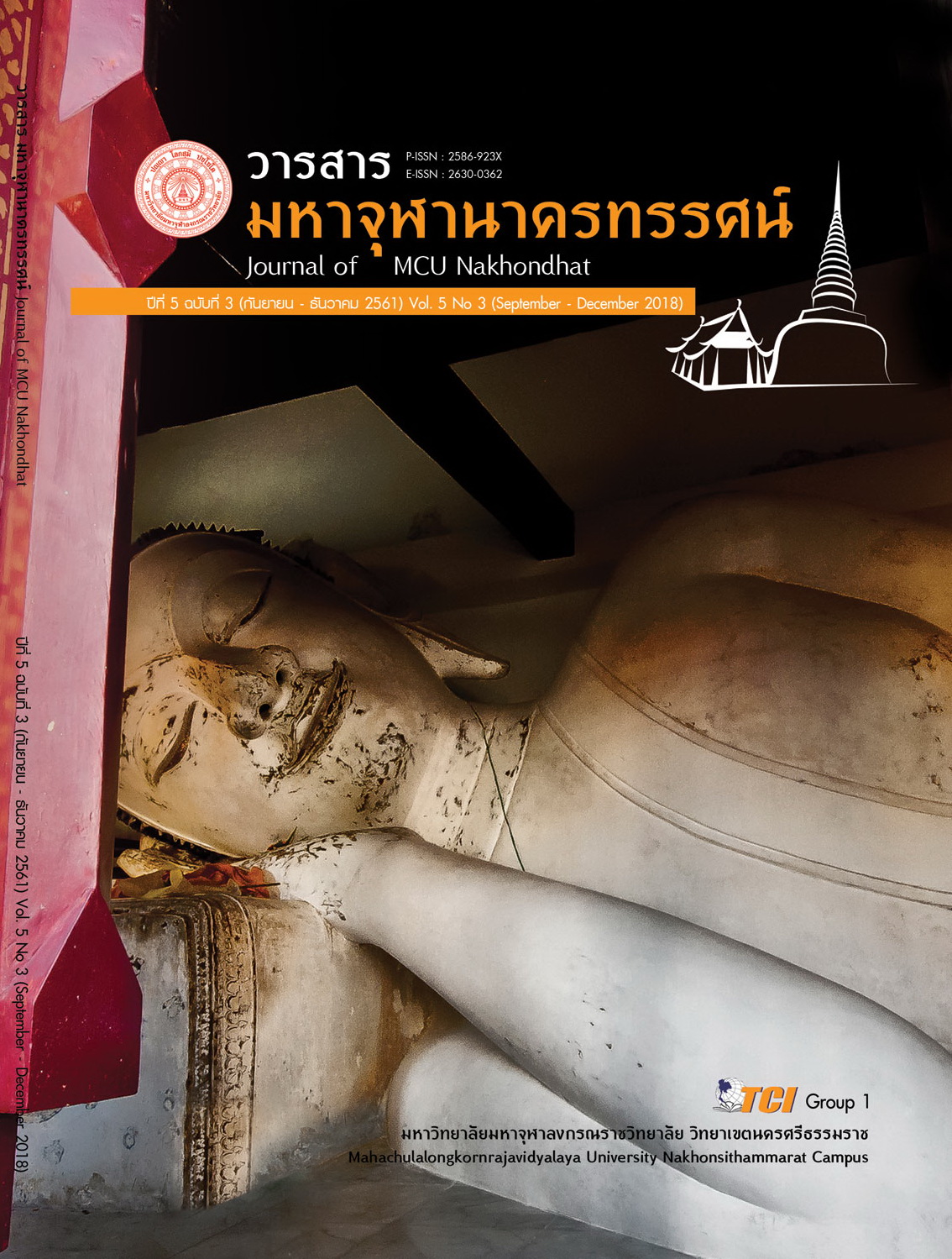LEARNING EXPERIENCE OF HUMANISTIC CARE.
Main Article Content
Abstract
The purpose of this study was to gain an understanding of learning experience of humanistic care. Qualitative approach with hermeneutic phenomenology technique was used in the study. The purposive sampling was used for this study consisted of 15 instructors that participant in Humanistic Nursing Care Program at College of Mount of Saint Vincent, New York, USA. The data collections used were in-depth interview, a tape recorder, and personal documents. The method described by Hermeneutic phenomenology under Benner concept was employed to analyze the data. The results of this study showed that:
Humanistic cares were the interaction of individuals on the basis of understanding, empathy, and attention or help to treat other people, accept a person, and understanding of the similarities and differences of each individual. Learning approach to humanistic cares consists of four aspects. 1) The recognition of human values, learners start by learning to understand them before using meditation and then began to learn other people by using the senses by listening attentively. 2) Understanding humanity, learners understand of the valuable experience of the individual. 3) Learning through real conditions, a learning experience for the students to relate to others and the environment in a real context, and 4) Reflective thinking, the instructor thought-provoking perspectives that make the students understands them and understands the reasons for each one. The results of this study the teachers can use applications in the areas of education and health, Providers of health care services can be guided to learn to care for human values to perform the services to the patients. Anyone can take care that human values are applied in everyday life as well.
Article Details
References
คมวัฒน์ รุ่งเรือง และศรินยา พลสิงห์ชาญ. (2558). การพัฒนาองค์ประกอบและตัวบ่งชี้คุณภาพบัณฑิตพยาบาล วิทยาลัยพยาบาลสังกัดสถาบันพระบรมราชชนก. วารสารพยาบาลและการศึกษา, 8(2), 95-110.
คัทลียา ศิริภัทรากูร แสนหลวง และ อุดมรัตน์ สงวนศิริธรรม. (2560). พยาบาลควรทำอย่างไรให้ตนเองเป็นผู้มีสุขภาพดี. พยาบาลสาร, 44(3).174-182.
ประเวศ วะสี. (2550). Humanized health care: คืนหัวใจให้ระบบสุขภาพ. รายงานการประชุมวิชาการ 8th HA National Forum 13-16 มีนาคม 2550.
พระธรรมปิฎก (ป.อ.ปยุตฺโต). (2540). พจนานุกรมพุทธศาสน์ ฉบับประมวลศัพท์ . กรุงเทพมหานคร: : โรงพิมพ์มหาจุฬาลงกรณราชวิทยาลัย.
พระพรหมโมลี (วิลาศ ญาณวโร,ป.ธ.9). ( 2545). โลกทีปนี. กรุงเทพมหานคร: สำนักพิมพ์ดอกหญ้า .
เพลินตา พรหมบัวศรี, จิริยา อินทนา, กัลยา ศรีมหันต์, เยาวลักษณ์ มีบุญมาก. (2556). การประเมินผลโครงการฝึกอบรมเชิงปฏิบัติการเรื่องการพัฒนากระบวนทัศน์ในการบริการด้วยหัวใจความเป็นมนุษย์. วารสารวิทยาลัยพระปกเกล้าจันทบุรี, 25(1), 39-49.
มกราพันธ์ จูฑะรสก, เพลินตา พรหมบัวศรี, วัชรี อมรโรจน์วรวุฒิ, ศุกร์ใจ เจริญสุข, ประเสริฐ อัตโตหิ,อนิษฐา จูฑะรสก และอรพิน สว่างวัฒนา. (2560). การสะท้อนเส้นทางการปฏิรูปกระบวนการเรียนรู้. วารสารพยาบาลกระทรวงสาธารณสุข, 27(2), 31-46.
มหาวิทยาลัยมหาจุฬาลงกรณราชวิทยาลัย. (2539). พระไตรปิฎกภาษาไทย ฉบับมหาจุฬาลงกรณราชวิทยาลัย . กรุงเทพมหานคร: โรงพิมพ์มหาจุฬาลงกรณราชวิทยาลัย.
รุ่งกาญจน์ วุฒิ อนุรักษ์ ปัญญานุวัฒน์, ฤตินันท สมุทร์ทัย และอัจฉราพร ศรีภูษณาพรรณ. (2558). การศึกษาสภาพและความต้องการพัฒนะสมรรถนะการจัดการเรียนการสอนของอาจารย์ใหม่ วิทยาลัยพยาบาลสังกัดสถาบันพระบรมราชชนก. วารสารพยาบาลและการศึกษา, 8(2), 9-23.
สหัทยา รัตนะจรณะ, กิ่งดาว การะเกด และ รัตน์ธนรส วงศ์อุดม. (2558). การพยาบาล: มุมมองของผู้ป่วยที่เข้ารับการรักษาในโรงพยาบาล. วารสารการพยาบาลและการศึกษา, 8(4), 140-152.
สำนักนโยบายและยุทธศาสตร์, กระทรวงสาธารณสุข. (2560). แผนยุทธศาสตร์กระทรวงสาธารณสุขปีงบประมาณ 2560. นนทบุรี: กระทรวงสาธารณสุข.
สุรีย์ ธรรมิกบวร. (เข้าถึงเมื่อ 8 กรกฎาคม 2561). การพัฒนาศักยภาพบุคคลากร: การพยาบาลด้วยหัวใจความเป็นมนุษย์. เข้าถึงได้จาก สืบค้นจาก http://www.nurse.ubu.ac.th/sub/knowledgedetail/1.pdf
Benner, P. (1994). Interpretive Phenomenology. Thousand Oak: CA: SAGE.
Heidegger M. (1962). Being and Time (MacQuaeeie J. & Robinson E. trans). New York: Harper & Row.
Husserl, E. (1965). Phenomenology and the Crisis of Philosophy (Lauer Q. trans.). Harper & Row,: New York.
Hwang, H. L., Tu, C. T., Chen, S., & Wang, H. H. (2012). Caring behaviors perceived by elderly residents of long-term care facilities: Scaledevelopment and psychometric assessment. The International Journal of Nursing Studies, 49(2), 183-190.
Larrivee, B. (2000). Transforming teaching practice: becoming the critically reflective teacher. ใน Reflective Practice,1 (หน้า 293-5).
Lee, P. R. . (1975). Epilogue. In: J. Howard and A. Strauss (Eds.). Humanizing Health Care. pp. 305-316. New York: John Wiley & Sons.
Leonard, V. W. (1989). A Heideggerian Phenomeno-logic perspective on the concept of the Person. ใน Advances in Nursing Science; (หน้า 9: 40-55.).
Noddings. (1995). Philosophy of Education. Colorado: Westview Press.
Swanson, K. M. (1991). Empirical development of a middle range theory of caring. Nursing Research, 40(3), 161-166.


